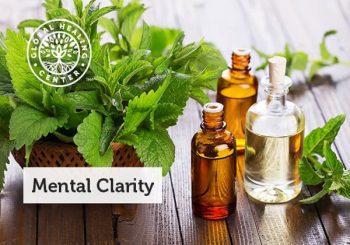Guest Writer for Wake Up World
Like any part of your body, the brain can become stressed and unwell. It can also stay healthy, sharp, and clear. Your brain is an incredible machine if you think about it. That 3-pound organ contains billions of cells with trillions of connections — creating your thoughts, impulses, memories, and movements. If you nurture your brain for mental clarity, you can keep a clear, active mind. Simple exercises can help. Certain herbs can pep up your brain, as well.
This article will show you how to create better concentration, clear your head, and stay on top of your game.
[pro_ad_display_adzone id=”110028″]
What Does Mental Clarity Mean?
When your mind is clear, you can easily make decisions, and you feel sharp, alert, and aware of your surroundings.
When your mind isn’t clear, you might feel anxious, distracted, and unable to concentrate. Some people call this collection of symptoms brain fog.[1, 2]
We all experience declines in mental clarity, perhaps due to stress, diet, or lack of sleep. Temporary changes in your blood sugar, blood pressure, or hormones can affect your mental clarity. Daily stress and anxiety also affect your mental clarity. This is all the more reason to engage in these simple ideas.
How to Improve Your Mental Clarity
Mental fogginess is something you can change. At any given time, a full 25 percent of your blood is in the brain at any one time. Oxygen in your blood feeds all the brain and nerve cells. Getting oxygen to your brain plays a key role in keeping your mind focused. So is clearing your mind of stray and anxious thoughts.
Whether you start meditating, do a cleanse, exercise more, or try mind-clearing herbs, you can create more focus, a happier mood, and better clarity.
Read on for several simple, practical ideas.
1. Change Your Diet
You are what you eat, and that’s also true for your mind. The wholesome nutrients — or lack thereof — in the foods you eat is one of the single greatest factors affecting your mental clarity.
Eat fruits, especially berries, as well as a variety of colorful vegetables for a clear mind. They can reduce age-related cognitive challenges at any stage of life![3, 4] Nuts and seeds contain omega-3 fatty acids, which are essential for brain health.[4] It’s best to eliminate meat and eat a plant-based diet.
Eliminating trigger foods is just as crucial for mental clarity as feeding your body with healthy whole foods. Many people are sensitive to foods without even realizing it. Common triggers include gluten, lectins, animal foods, and nightshades. When you eat these foods, not only can they affect your digestion, but also your mind. If you can, go organic to eliminate the traces of pesticides on foods, or, at minimum, clean your veggies thoroughly before eating.
2. Try a Cleanse, Detox, or Fast
If your diet is unhealthy, you will not be able to experience the brightest, happiest state of mind. You can fix that. Engage your body’s self-healing by doing a body detox or cleanse. While there are hundreds of options, the basic concept involves eliminating all trigger foods and toxins for a period of time.
A week works well, followed by a slow reintroduction of foods. Adding various foods gradually enables you to identify how your body and mind react. If you find a drop in mental clarity, then seriously consider cutting that food out for good.
Cleansing is a great way to give up bad-habit foods, like sugar, caffeine, or excessive carbs. It’s a great way to kick-start healthy new habits. Your brain will thank you.
If you want to take it to the next level, try a juice or water fast. This involves eliminating all solid food and consuming only liquids for a period of time. Check with your healthcare provider before starting a fast, especially if you take any medications or have any health conditions. Fasting is an incredible tool for body healing.[6]
3. Use Essential Oils
Declutter your mind — and refresh your surroundings with a lovely scent — by using essential oils. Certain oils can improve your attention span and decrease stress. Add a few drops into a diffuser and allow it to work its mind-clearing magic. The best choices for mental clarity include the following:
Rosemary
This herb has a stimulating effect, which can impact brain wave activity and mood.[7]
Peppermint
Smelling peppermint oil can increase alertness and improve memory, two important facets of mental clarity.[8]
Lemon Balm
Lemon balm (Melissa officinalis) can increase alertness, boost mood, and even help problem-solving.[9, 10]
4. Get Restful Sleep
Sleep and mental clarity are closely linked. When you’re overly tired, your brain can’t work at full capacity.[11] Furthermore, not getting seven to nine hours per night is a cause of brain fog.[1]
When you sleep, your brain makes connections between neurons — sort of like clearing out cobwebs. Restorative sleep involves several cycles of REM (rapid eye movement), dreams, and other periods when your body and mind are healing and resting. If you have trouble falling asleep or you wake during the night, try our helpful suggestions for a good night’s rest.
5. Write in a Journal
Writing is a powerful tool to release the thoughts, worries, and distractions that clutter your mind. Some people call it a brain dump. Buy a journal that you love, or just find an old empty notebook, and get it all out. Try doing morning pages — the act of writing two to three full pages before starting your main daily activities.
Your writing does not have to be profound or even good. Just get the rambling, random thoughts from your brain onto the page! If it helps, you can also write a to-do list to get all those things you need to remember from your mind and onto a page. This clears your thoughts and allows you to stay focused on the task at hand.
6. Take Up Meditation
Meditation is one of the most profound and proven ways to clear the restless mind and have a more positive attitude, improved concentration, and relaxation.[12] If you’ve never meditated before, we have some meditation tips for beginners.
Find a peaceful spot with quiet and peaceful stimuli, such as relaxing lighting or a diffuser full of essential oils. Sit or lie down comfortably. Set a timer for 10 minutes — though you can do more or less. During the meditation period, concentrate on your breath and try to allow the extraneous thoughts that come to just pass away like clouds. Don’t worry if you don’t have a clear mind during meditation.
It takes time and practice, but your body and mind will see a difference before long. The best part? The clearer mind often comes after the meditation and can last all day long.
7. Get Your Fitness On!
Exercise, including light activity such as yoga, can also improve your mood and make you feel more relaxed.[13] Any physical activity has the added benefit of improving your sleep as well.[13]
Other than diet, exercise has the greatest impact on your health — and directly affects your mental clarity. Whether you go for long walks outdoors, engage in yoga, take a full-on boot camp, or lift weights in the gym, exercise pays dividends.
8. Try Mind-Clearing Herbs
Herbal supplements can help reduce brain fog and decrease stress. Several of these herbs have a long history of traditional use. Some can interact with other medicines, so discuss with your healthcare provider if needed.
Bacopa monnieri
Bacopa monnieri, an Ayurvedic herb also known as Brahmi, is traditionally used to reduce stress. Scientists found that Bacopa also improves mood and your ability to think clearly.[14] The fresh leaves have a lemony, earthy smell. An organic Brahmi supplement or tea might help you reduce the clutter in your mind.
Ginseng
Ginseng is a powerful root that grows around the world, with several different varieties. In research studies, ginseng has helped people decrease stress and improve thinking.[15, 16] You can find multiple types of ginseng blended in teas and supplements. Make sure you look for organic ginseng without unnecessary fillers.
Ginkgo Biloba
Traditional Chinese medicine has long used ginkgo leaf extract as a complementary supplement for the mind.[17] Gingko supports overall brain health and healthy circulation — which affects mental alertness.
9. Take the Right Supplements
When your body doesn’t have the right balance of vitamins and minerals, your mind might feel unclear.[18] Here are a few types of nutrients that may aid in decreasing fogginess and improving mental clarity.
Probiotics
Beneficial microbes living in your gut play a crucial role in your brain health.[19] Known as probiotics, these microbes play a clearly established role in your mental wellness.[19] Support a healthy gut flora for mental clarity with a superior formula like Floratrex™, which has 25 strains and 75 billion CFU (colony-forming units). Much of the body’s serotonin is produced in the intestinal tract and depends on a healthy gut biome.
B Vitamins
There are multiple B vitamins, including folic acid or folate, biotin, B-6, and B-12. When you are not getting enough of the B vitamins, you could experience cognitive impairment, memory loss, and general grumpiness.[21] Vitamin B-12, in particular, is connected to brain health and focus. You can try a standalone B-12 or a supplement with a broad spectrum of B vitamins.[22]
Omega-3
Omega-3 fatty acids are molecules with a multitude of benefits. You can find plant-based omega-3 fatty acids such as flaxseed or algae oil.[23, 24] These important nutrients are connected to mental health and focus.[25] Make sure you eat organic, all-natural sources of omega-3.
Points to Remember
Mental clarity means that you can think clearly, concentrate, and focus. If you lack mental clarity and your thoughts are running wild, the good news is that you can make simple changes to improve your cognitive function.
The single most important thing you can do is change your diet! Eliminate trigger foods that many people are sensitive to, like gluten, animal foods, and dairy. Add more antioxidant-rich fruits and vegetables! Also, exercise is probably the second most important lifestyle factor in creating a clear mind.
Beyond that, you can spend time calming the mind in meditation, or journal to brain-dump your anxious and worrisome daily thoughts. Make sure you get enough of the right supplements, like B-12, omega-3 fatty acids, and probiotics, and try mind-clearing herbs like ginseng, Bacopa, and Ginkgo biloba.
These strategies will help reduce brain fog and improve attention.
Article Sources:
- Fibro fog. Arthritis Foundation. Accessed 13 June 2019.
- Cognitive changes. National Multiple Sclerosis Society. Accessed 13 June 2019.
- Spencer S, et al. Food for thought: how nutrition impacts cognition and emotion. npj Science of Food 2017;1.
- Foods linked to better brainpower. Harvard Medical School. Accessed 11 June 2019.
- 5 Klein AV, Kiat H. Detox diets for toxin elimination and weight management: a critical review of the evidence. J Hum Nutr Diet. 2015 Dec;28(6):675.
- Shojaie M, et al. Intermittent fasting could ameliorate cognitive function against distress by regulation of inflammatory response pathway. J Adv Res. 2017 Nov; 8(6):697-701.
- Sayorwan W, et al. Effects of inhaled rosemary oil on subjective feelings and activities of the nervous system. Sci Pharm. 2013 Apr-Jun;81(2):531-542.
- Moss M, et al. Modulation of cognitive performance and mood by aromas of peppermint and ylang-ylang. Int J Neurosci. 2008 Jan;118(1):59-77.
- Spiridon I, et al. Antioxidant capacity and total phenolic contents of oregano (Origanum vulgare), lavender (Lavandula angustifolia) and lemon balm (Melissa officinalis) from Romania. Nat Prod Res. 2011 Oct;25(17):1657-1661.
- Scholey A, et al. Anti-stress effects of M. Officinalis containing foods. Nutrients. 2014 Oct 30;6(11):4805-4821.
- Neu D, et al. Cognitive impairment in fatigue and sleepiness associated conditions. Psychiatry Res. 2011 Aug 30;189(1):128-134.
- Deepak KK. Meditation induces physical relaxation and enhances cognition: A perplexing paradox. Prog Brain Res. 2019;244:85-99.
- Penedo FJ, Dahn JR. Exercise and well-being: a review of mental and physical health benefits associated with physical activity. Curr Opin Psychiatry. 2005:18(2):189-193.
- Benson S, et al. An acute, double-blind, placebo-controlled cross-over study of 320-mg and 640-mg doses of Bacopa monnieri (CDRI 08) on multitasking stress reactivity and mood. Phytother Res. 2013 Jun 21.
- Rinwa P, Kumar A. Modulation of nitrergic signalling pathway by American ginseng attenuates chronic unpredictable stress-induced cognitive impairment, neuroinflammation, and biochemical alterations. Naunyn Schmiedebergs Arch Pharmacol. 2014 Feb;387(2):129-141.
- Scholey A. Effects of American ginseng (Panax quinquefolius) on neurocognitive function: an acute, randomised, double-blind, placebo-controlled, crossover study. Psychopharmacology (Berl). 2010 Oct;212(3):345-356.
- Ginkgo. National Institutes of Health National Center for Complementary and Integrative Health. Updated September 2016. Accessed 11 June 2019.
- Gomez-Pinilla F. Brain foods: the effects of nutrients on brain function. Nat Rev Neurosci. 2008 Jul; 9(7):568-578.
- 4 fast facts about the gut-brain connection. National Institutes of Health National Center for Complementary and Integrative Health. Last modified 24 September 2017. Accessed 10 June 2019.
- Probiotics may help boost mood and cognitive function. Harvard Medical School. Accessed 8 June 2019.
- Kennedy DO. B vitamins and the brain: mechanisms, dose and efficacy—a review. Nutrients. 2016 Feb; 8(2):68.
- Pawlak R, et al. How prevalent is vitamin B(12) deficiency among vegetarians? Nutr Rev. 2013 Feb;71(2):110-117.
- Potential health benefits of plant vs. marine omega-3 fatty acids. Stanford Medicine. Accessed 13 June 2019.
- Dewell A, et al. Low- and high-dose plant and marine (n-3) fatty acids do not affect plasma inflammatory markers in adults with metabolic syndrome. J Nutr. 2011 Dec; 141(12):2166-2171.
- Okereke OI, et al. The VITamin D and OmegA-3 TriaL-Depression Endpoint Prevention (VITAL-DEP): Rationale and design of a large-scale ancillary study evaluating vitamin D and marine omega-3 fatty acid supplements for prevention of late-life depression. Contemp Clin Trials. 2018 May;68:133-145.
Originally published at Global Healing Center and reproduced here with permission.
Recommended articles by Dr. Edward Group:
- Natural Appetite Suppressants: The Best Ways to Eat Less and Lose Weight
- Everything You Need to Know About Hemp vs. CBD
- CoQ10 Benefits: A Powerful Energizing Antioxidant for Health and Vitality
- How to Increase Testosterone: Natural Hacks That Work
- 9 Natural Remedies for Headaches for Quick Relief
- The Healing Power of a Gut Cleanse: 6-Day Detox
- Hormonal Imbalance in Women: Top Causes and Home Remedies
- The Top 10 Detox Herbs
- 14 Foods that Cleanse the Liver
- Top 5 Foods for the Pineal Gland
About the author:
Dr. Edward F. Group III (DC, ND, DACBN, DCBCN, DABFM) founded Global Healing Center in 1998 with the goal of providing the highest quality natural health information and products. He is world-renowned for his research on the root cause of disease. Under his leadership, Global Healing Center earned recognition as one of the largest natural and organic health resources in the world. Dr. Group is a veteran of the United States Army and has attended both Harvard and MIT business schools. He is a best-selling author and a frequent guest on radio and television programs, documentary films, and in major publications.
Dr. Group centers his philosophy around the understanding that the root cause of disease stems from the accumulation of toxins in the body and is exacerbated by daily exposure to a toxic living environment. He believes it is his personal mission to teach and promote philosophies that produce good health, a clean environment, and positive thinking. This, he believes, can restore happiness and love to the world.
For more, please visit Global Healing Center.
[pro_ad_display_adzone id=”110027″]








